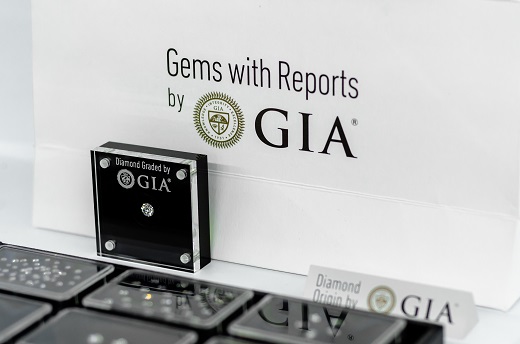GIA Sees Spike in Synthetics Fraud
 RAPAPORT... The Gemological Institute of America (GIA) has seen a rise in submissions of lab-grown diamonds with counterfeit inscriptions that make the stones appear natural.Clients using the GIA's update or verification services are increasingly sending in goods that prove to be synthetic, the organization said Monday. These stones have falsified girdle engravings that reference a genuine natural-diamond report number, while most have almost identical measurements and weights to the natural diamonds they mimic.In a recent case, someone submitted a 3.075-carat, H-color, VVS2-clarity, triple-Ex, lab-grown diamond to GIA Antwerp for an update. The stone carried a report for a 3.078-carat, G-color, internally flawless, triple-Ex natural diamond. The synthetic stone's real-life dimensions were within hundredths of millimeters of the measurements in the natural-diamond report, the GIA noted."This unfortunate situation demonstrates why it is important, especially in any transaction where the buyer does not have a trusted relationship with the seller, to have the diamond-grading report updated before completing a purchase," said Tom Moses, the GIA's executive vice president and chief laboratory and research officer. The GIA blotted out the counterfeit inscription and inscribed a report number for a new certificate that it issued, adding the term "laboratory-grown" on the girdle, as is its practice.In February, the institute reported that it had received a number of lab-grown or treated stones carrying natural reports and fake inscriptions.Image: GIA-graded diamonds. (Shutterstock)
RAPAPORT... The Gemological Institute of America (GIA) has seen a rise in submissions of lab-grown diamonds with counterfeit inscriptions that make the stones appear natural.Clients using the GIA's update or verification services are increasingly sending in goods that prove to be synthetic, the organization said Monday. These stones have falsified girdle engravings that reference a genuine natural-diamond report number, while most have almost identical measurements and weights to the natural diamonds they mimic.In a recent case, someone submitted a 3.075-carat, H-color, VVS2-clarity, triple-Ex, lab-grown diamond to GIA Antwerp for an update. The stone carried a report for a 3.078-carat, G-color, internally flawless, triple-Ex natural diamond. The synthetic stone's real-life dimensions were within hundredths of millimeters of the measurements in the natural-diamond report, the GIA noted."This unfortunate situation demonstrates why it is important, especially in any transaction where the buyer does not have a trusted relationship with the seller, to have the diamond-grading report updated before completing a purchase," said Tom Moses, the GIA's executive vice president and chief laboratory and research officer. The GIA blotted out the counterfeit inscription and inscribed a report number for a new certificate that it issued, adding the term "laboratory-grown" on the girdle, as is its practice.In February, the institute reported that it had received a number of lab-grown or treated stones carrying natural reports and fake inscriptions.Image: GIA-graded diamonds. (Shutterstock)